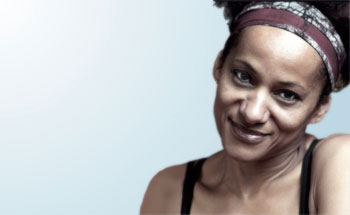French-Congolese dance performer, choreographer, teacher and philosopher Zab Manoungo epitomizes the concept of the consummate artist. The daughter of a revolutionary African intellectual who fought against colonialism, Zab Manoungo was raised with a Pan-Africanist cultural consciousness which clearly informs her journey as a dance artist.
She is currently in Toronto presenting her COBA-commissioned (Collective of Black Artists) work entitled “On a Clear Day” (ends today, March 13th). The opening of COBA’s Breaking Point! at Harbourfront’s Fleck Dance Theatre, this past Friday was a resounding success.
AfroToronto.com spoke to Zab Manoungo before this weekend’s triple presentation. She was thrilled to have the opportunity to work with COBA for the first time. While COBA has commissioned works in the past by choreographers from Senegal, Haiti, and South Africa, this marks COBA’s first Canadian-based commission.
For the past twenty years, Zab Manoungo has been at the helm of her own Montreal-based dance company, Nyata Nyata. A highly sought-after dancer and choreographer, her creations have been showcased internationally. In addition to her dance credentials, she also holds a Master’s degree in philosophy and teaches the subject at Montmorency College in Laval, Quebec.
She tells AfroToronto.com that dance, music and philosophy are one in her perspective. “Most great philosophers, from Socrates to Nietzsche, have celebrated the art of dance as one of the most important and fundamental endeavours at the level of human intelligence. Thus, it’s not a new thing to make such a rapprochement, unlike what may be commonly believed. We tend to separate body and spirit in the West. From my vantage point, however, it’s a joyous thing to join the two because philosophy is really the art of questions, and art allows me to answer,” she adds.
When asked how she discovered her passion for dance, she takes us back to her early childhood in Congo-Brazzaville, where she was part of several dance groups. She mentions that, at the time, her country was going through its post-colonial independence era, and dance was partly how her people redefined themselves in the face of modernity. There was a whole movement around this development, so it was a great opportunity to explore rhythm and traditions.
Eventually, political developments marked by coup d’états brought her family to France. There, she continued to pursue her interest in dance with other groups of Africans. She recounts to us: “The environment in France was much more Pan-Africanist. I came across students from throughout the continent and the diaspora. I started working with those diverse groups in universities, and my interest in the art refined itself to the point of necessitating research and the development of a discipline.”
Zab Manoungo realized through her journey that she was not satisfied with the way in which tradition was approached. She found most people’s interpretation of African dance as being too fixed, too rigid, too representative and too politicized. “I was looking for another road which would be more personal,” she clarifies.
In her opinion, dance allows us to have access to a whole new level of understanding of our relationship with the world -- through the environment, our interactions with the sacred, and the education of the body and the spirit. “When we study African rhythms, we discover that they transmit tremendous knowledge. That’s why I’ve put so much emphasis on understanding rhythm as being structural in the relationship between mind and body. That’s why I have and continue to work towards breaking those limiting representations of traditional dance both in the West and in Africa,” as she explains to AfroToronto.com.
As a daughter of post-independence Africa who has transposed herself within various cultures, Zab Manoungo reveals to us that she cherishes a long-held idea of an African cultural renaissance. She points to her working collaboration with COBA as a representation of how different African communities have matured to the point of calling on each other to redefine African diasporic culture. As this weekend’s diverse choreographies are displayed at the Fleck Dance Theatre, Zab Manoungo’s vision of a Pan-African dance universe is alive and well.





